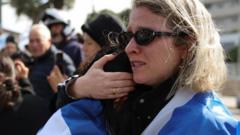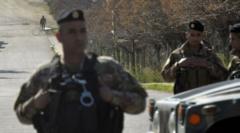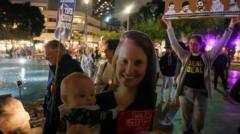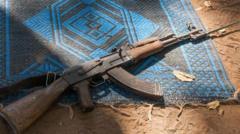In a move that raises the stakes in the fragile ceasefire between Israel and Hezbollah, the Israeli military announced plans to retain a temporary troop presence in five key locations in southern Lebanon, deferring a complete withdrawal that was mandated by a truce agreement. The situation has escalated after a prolonged war that concluded with a ceasefire in late November, which entailed both Israel and Hezbollah relinquishing southern Lebanese control to the Lebanese military.
### Israel Extends Military Presence in Southern Lebanon Amid Concerns of Renewed Conflict

### Israel Extends Military Presence in Southern Lebanon Amid Concerns of Renewed Conflict
Israel's decision to maintain troops in strategic locations in southern Lebanon stirs fears of escalated violence, as tensions with Hezbollah persist.
Despite a three-week extension to the withdrawal deadline initially set for January, sporadic violence has erupted intermittently, including a recent Israeli airstrike in southern Lebanon that eliminated a Hamas leader. This has reignited concerns within the Israeli government about the perceived threats from Hezbollah, which has a history of dominance in the region and whose actions have been viewed as non-compliant to the ceasefire agreement.
Military spokesman Lt. Col. Nadav Shoshani emphasized the necessity for a continued Israeli presence for the sake of local security, stating that troop deployments would remain "temporarily" at essential points along the 75-mile border. Although the specifics regarding the duration of this troop presence remain unclear, many worry that this extension could impede the safe return of civilians to their homes in the region.
The military's choice to act comes in the wake of apprehensions surrounding Hezbollah’s ongoing influence and military capacity in southern Lebanon, with both sides facing scrutiny over their commitments to the ceasefire agreement. As the situation unfolds, the prospect of renewed hostilities looms large, with both governments navigating a complex landscape of military readiness and civilian safety amidst a potentially volatile standoff.
Military spokesman Lt. Col. Nadav Shoshani emphasized the necessity for a continued Israeli presence for the sake of local security, stating that troop deployments would remain "temporarily" at essential points along the 75-mile border. Although the specifics regarding the duration of this troop presence remain unclear, many worry that this extension could impede the safe return of civilians to their homes in the region.
The military's choice to act comes in the wake of apprehensions surrounding Hezbollah’s ongoing influence and military capacity in southern Lebanon, with both sides facing scrutiny over their commitments to the ceasefire agreement. As the situation unfolds, the prospect of renewed hostilities looms large, with both governments navigating a complex landscape of military readiness and civilian safety amidst a potentially volatile standoff.



















